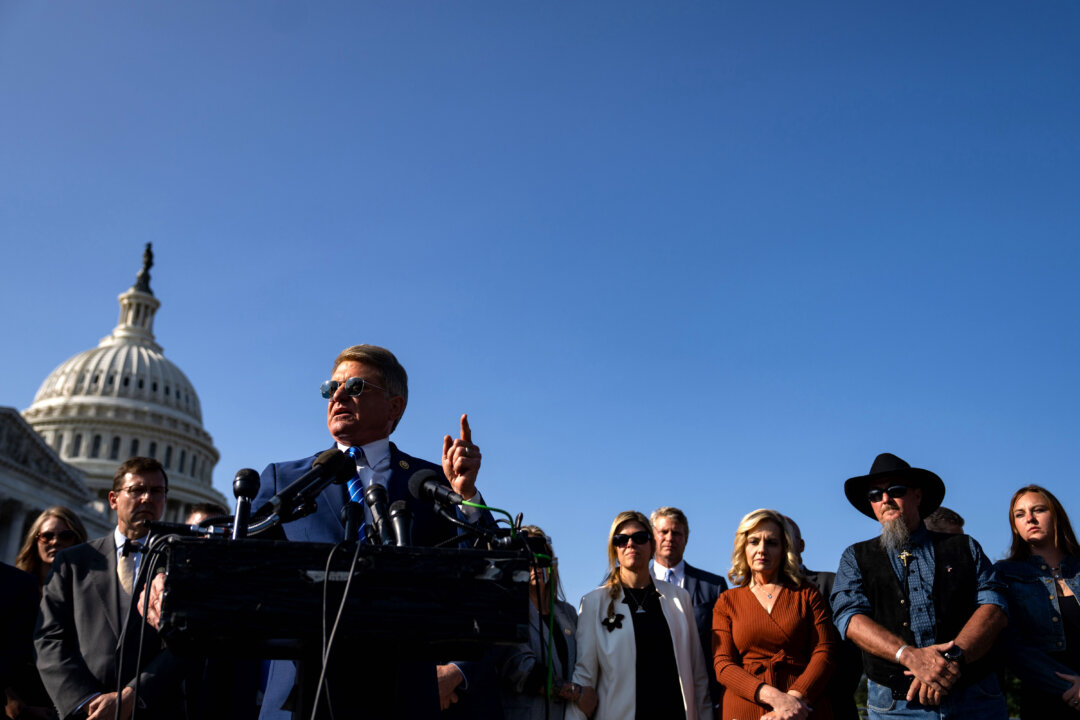The Republican-led panel blames Biden, Harris, Blinken, and Sullivan for mismanagement and a cover-up. Democrats dismissed claims as election-year posturing.
The Republican-led House Foreign Affairs Committee has released findings from its three-year probe into the United States’ chaotic August 2021 withdrawal from Afghanistan, and Democrat committee members have issued their own minority staff memorandum on the investigation.
The committee’s report places responsibility for events leading up to the Aug. 26, 2021, Abbey Gate bombing—which left more than 180 dead, including 13 U.S. service members—on President Joe Biden and his White House advisers.
“The evidence proves President Biden’s decision to withdraw all U.S. troops was not based on the security situation, the Doha Agreement, or the advice of his senior national security advisors or our allies,” the 345-page “Willful Blindness” report states.
“Rather, it was premised on his longstanding and unyielding opinion that the United States should no longer be in Afghanistan.”
The report alleges that the Biden administration “prioritized the optics of the withdrawal over the security of U.S. personnel on the ground.”
House Foreign Affairs Committee Democrats countered with a 59-page memorandum penned by Rep. Gregory Meeks (D-N.Y.), calling the Republican-led report a “predetermined, partisan narrative” that was issued “in the heat of an election season.”
Democrats said that the “factual narrative” of the investigation is “not new” and aligns with the State Department’s After Action Report (AAR), published in March 2022.
“Since it places the start of the withdrawal in the Trump administration, this narrative is not a neat political tool with which to assail the Biden administration,” the memo states.
The AAR cited “the decisions of both President Trump and President Biden to end the U.S. military mission in Afghanistan” as having “serious consequences for the viability of the Afghan government and its security.”
White House spokesperson Sharon Yang said in a statement that the Republican-led report was based on “cherry-picked facts, inaccurate characterizations, and preexisting biases.”
The Republican report says that committee Democrats, State Department officials, and the White House resisted efforts to investigate the bungled withdrawal, an impasse that continued until Republicans regained the House after the 2022 midterms.
The investigation included seven public hearings and roundtables between March 2023 and March 2024 and 18 transcribed narratives from “closed-door interviews” with decision-makers involved in the operation, as well as an analysis of more than 20,000 pages of documents.
The report issues five conclusions and 23 recommendations for planning noncombatant emergency evacuations.
“The Biden–Harris administration was determined to withdraw from Afghanistan, with or without the Doha Agreement and no matter the cost,” the report states. “Accordingly, they ignored the conditions in the Doha Agreement, pleas of the Afghan government, and the objections by our NATO allies, deciding to unilaterally withdraw from the country.”
The report says the administration “failed to plan for all contingencies, including a noncombatant emergency evacuation (NEO) and refused to order a NEO until after the Taliban had already entered Kabul.”
The ensuing chaos “created an unsafe environment” at Hamad Karzai International Airport in Kabul, the report states. It alleges that Biden’s rejection of advice to maintain 2,500 U.S. troops in Afghanistan cost the United States the use of the more-stable Bagram Air Base, built and controlled by the United States, and necessitated the use of the civilian airport.
“In the aftermath of the withdrawal, U.S. national security was degraded as Afghanistan once again became a haven for terrorists, including al Qaeda and ISIS-K,” the report states.
The committee analysis holds that the administration was not transparent about its actions in August 2021 and “at every stage of the withdrawal, from before the go-to-zero order until today.”
The report states that the committee repeatedly requested that Secretary of State Antony Blinken appear before it in a public hearing, but to no avail. It states that a subpoena mandates that the secretary of state appear for a Sept. 19 hearing and warns that “appropriate measures, including congressional contempt, shall be pursued should Secretary Blinken not appear.”
At a White House briefing on the afternoon of Sept. 9, National Security Council spokesman John Kirby responded to the report, saying “there was no point” in securing Bagram Air Base for use during the evacuation. Doing so would have required “thousands of additional U.S. troops,” he said, and “would have required a dangerous trek for evacuees over Taliban-controlled territory.”
Kirby said that “there was no deception, lying, or lack of transparency by this administration either during or after the withdrawal.”
“We cooperated extensively in this investigation and we continue to work with the War Commission,” he said.
At a news briefing following the report’s release, House Foreign Affairs Committee Chairman Rep. Michael McCaul (R-Texas) said that he believes that the fall of Afghanistan emboldened U.S. adversaries and led to subsequent global unrest, including the Ukraine war.
“This is not political,” he said.
“I intend to continue this investigation after the election, not in a partisan way, but because the American people deserve the truth so that this never, ever happens again.”
The Associated Press contributed to this report.

